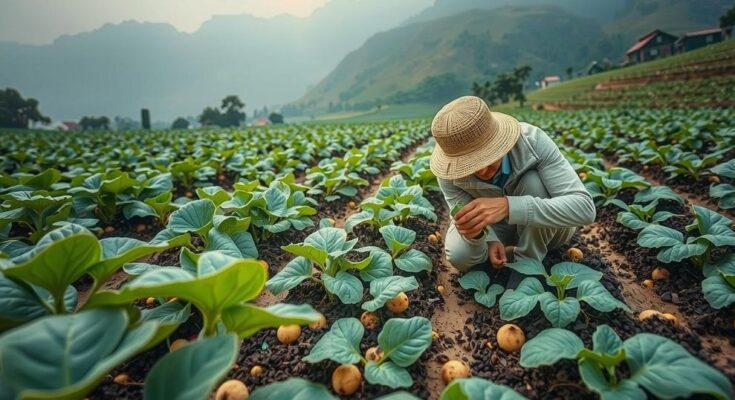Research by Li Jieping at the International Potato Center reveals that rising temperatures due to climate change can halve potato yields in China, which is responsible for over 22% of global production. The study indicates that an increase of 3 degrees Celsius leads to smaller potatoes and reduced crop yields, raising concerns for food security. Adaptive changes in farming practices are vital to offset these risks, emphasizing the urgency for higher-yielding potato varieties.
Molecular biologist Li Jieping and his team based in Beijing are conducting vital research to prepare for the increasing temperatures anticipated by the end of the century as a result of climate change. Their study reveals that potatoes grown under simulated conditions reflecting a temperature rise of 3 degrees Celsius yield unusually small sizes, averaging only 136 grams—less than half the weight of the most widely cultivated potato variety in China, which typically weighs twice as much as a baseball. This discovery raises significant concerns for food security, given that China is the world’s largest potato producer, contributing over 22 percent of global production.
Jieping commenced a three-year study at the International Potato Center (CIP), focusing on two common potato varieties in China. He expressed his apprehension regarding the future of potato yields, emphasizing that “Farmers will harvest fewer potato tubers; it will influence food security” – Reuters. The research found that while growth accelerated by ten days under elevated temperatures, yields diminished by more than 50 percent.
Collaborating with the Chinese government, the CIP study addresses how farmers could adjust to climate-induced challenges, exacerbated by both higher temperatures and increased humidity. According to a United Nations report from October, global temperatures could rise by 3.1 degrees Celsius above pre-industrial levels by the year 2100. Given these projections, Jieping indicates that Chinese farmers must adapt their planting schedules to springtime or consider relocating to higher altitudes to avoid excessive heat. He highlighted the need for various strategies, as failure to do so could lead to lower incomes for farmers due to insufficient yields, consequently causing an increase in potato prices. Furthermore, ongoing concerns around excessive humidity in regions such as Inner Mongolia prompt farmers to quickly harvest their crops to protect them from impending rain.
The research underscores the urgent requirement for farmers to access higher-yielding potato varieties that are also less susceptible to diseases. The challenge posed by climate change necessitates proactive measures to ensure persistent agricultural productivity and food security throughout China and beyond.
The background of this study reflects the significant impact that climate change is likely to have on global agricultural practices, particularly in key food-producing nations like China. With China being the foremost producer of potatoes, the implications of rising temperatures and changing precipitation patterns could severely threaten yield outputs and food availability. As research indicates an expected temperature rise of over 3 degrees Celsius, understanding and adapting agricultural methods to these changes is critical to maintaining food security.
In conclusion, the research undertaken by Dr. Li Jieping and his team highlights a pressing issue regarding the future of potato yields in the face of climate change. The significant reduction in potato sizes and yields under projected temperature increases poses serious risks to food security in China and will require swift and adaptive farming methods. It is crucial for farmers to implement strategies to mitigate the adverse effects of warming temperatures and increased humidity, in order to sustain production and prevent economic difficulties arising from low harvests.
Original Source: www.outlookbusiness.com




